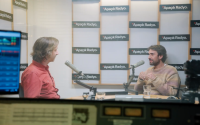30 September 2005David Usborne
One man in Boston has a plan that he hopes will bridge the world's gaping digital divide - and quickly. The visionary is Nicholas Negroponte, director of the Media Lab at the Massachusetts Institute of Technology and his idea consists of a new kind of laptop computer that will cost just $100 (£57) to buy.
It will also be a little different in design from the sleek machines some of us in the west have learned to love or covet. It will be foldable in different ways, encased in bump-proof rubber and will include a hand-crank to give it power in those corners of the globe where electricity supply is patchy.
The first prototype of the machine should be ready by November and Mr Negroponte - who was one of the first prophets of the internet before most of us understood the word - hopes to put them into production next year.
In fact, he expects to churn out about 15 million of them within one year, shipping most of them at first to children in Brazil, Egypt, Thailand and South Africa.
Describing the unusual design of his sub-laptop yesterday, Mr Negroponte insisted that it would "have to be absolutely indestructible". The mission is to create a tool that children almost anywhere can use and can easily carry between their classrooms and their homes. For that reason, for instance, the AC adaptor cable will double as a shoulder strap.
Support is also coming from closer to home. The Governor of Massachusetts, Mitt Romney, has also committed to buying half a million of the machines for distribution to lower-income school students in the state.
The inspiration of the project, which has backing from US companies including Google, came to Mr Negroponte when he was travelling recently with his wife in Cambodia. He spotted children in a rural area carrying laptops - which the couple's foundation had donated - from school to their homes.
To cut costs, the machines would have a 500-megahertz processor provided by Advanced Micro Devices, which is a little slow by today's lightning-speed standards.
However, it would be set up for wireless connectivity, known as wi-fi, to give users the greatest chance of hooking up to the internet. It would run on a Linux platform, which is freely available, rather than Microsoft's more expensive Windows.
It is not the first time that someone has attempted to develop a rock-bottom price device to feed the potentially monumental market in developing countries for laptops. Part of the problem has been stopping donated machines leaking onto the commercial market.
Mr Negroponte said that his laptops would be so distinctive in design and look that stealing and re-selling them would be akin to stealing furniture from a church. People would recognise where they come from. The look of the devices, he said yesterday, meant there would be "socially a stigma to be carrying one if you are not a student or a teacher". Consequently, he imagines that no more than 2 per cent of the devices would fall into that murky "grey market".
Other features of the device include being able to switch from a full colour screen to a monochrome alternative, which will much more easily viewed in bright sunlight. In the first models, turning the crank for one minute will provide 10 minutes of power.
Mr Negroponte says that rather than getting more expensive, as some brands do, he hopes that his machines will get cheaper through economies of scale. He pointed out that $100 was still expensive in many parts of the world. And he also expects the technology to improve.
http://news.independent.co.uk/world/science_technology/article316113.ece






